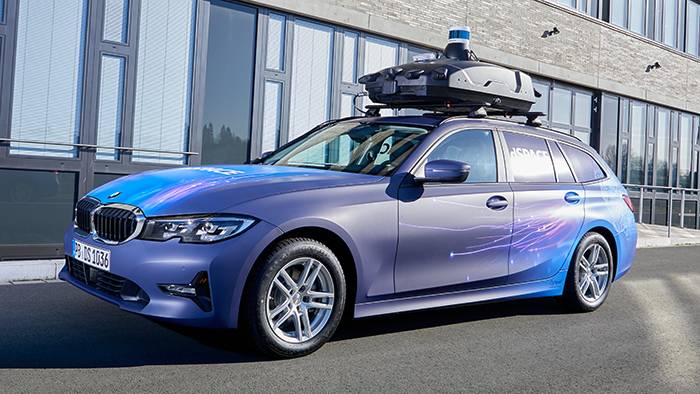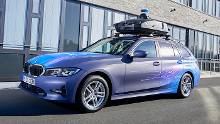dSPACE Sensor Vehicles
Why does dSPACE collect traffic data?
Quite simply, so that in the future you can be safe on the road with a highly automated or even self-driving vehicle, and so that other vehicles of the future also move along safely in road traffic. With dSPACE solutions, engineers and programmers in the automotive and commercial vehicle industries worldwide are constantly developing and testing new applications for highly automated and autonomous driving.
Long before self-driving cars, shuttle buses, or delivery trucks hit the road, driving functions are tuned, developed, and tested for all kinds of traffic situations. How does the vehicle have to behave during interaction with other road users? What does it have to do when a ball suddenly rolls onto the road? How does the vehicle navigate independently in multi-lane urban traffic?
The development of driving functions for such situations requires real-life situations, which are then later run through again and again in simulations. With the sensor vehicle, we record such situations with video cameras and lidar and radar sensors. Before the data is used, we anonymize it as a matter of course. Individual persons or license plates can thus no longer be identified.
This is what people and machines see: Road users become moving boxes, and a movie of the real world becomes an animated world:
Information for Data Subjects (Passers-By/Road Users) About the Direct Collection of Data (Art. 13 of the GDPR)
Data controller:
dSPACE GmbH, Rathenaustrasse 26, 33102 Paderborn (Germany)
+49 5251 1638-0, info@dspace.de, https://www.dspace.com
Legal representative:
Dr. Carsten Hoff, Tel: +49 5251 1638-0, www.dspace.com, info@dspace.de
Data protection officer:
Matthias Schütz, Tel: 05221 87292-10, e-mail: datenschutz-dspace@audatis.de
Information About the Data Processing:
Aim of the data processing:
Collection of sensor data by a dSPACE vehicle.
Data collection by: Camera, lidar, radar.
Personal data is generated by camera recordings made while the vehicle is in motion.
By means of anonymization software, a blurred image is created immediately after the recording, so that no further reference to a person can be made.
Legitimate interests of the data controller:
Required collection of data from road traffic/public roads for processing for purposes of autonomous driving.
Legal basis for the data processing:
The processing is required to safeguard the legitimate interest of the controller or a third party pursuant to Art. 6 section 1 point (f) of the GDPR and no interests or fundamental rights and freedoms of the data subject prevail.
Categories of recipients:
Processor (Processor within the meaning of Art. 4 in conjunction with Art. 28 DS-GVO)
Only anonymized data is forwarded to order processors. No further reference to a person can be made in this case.
Provider (data processor):
UAI (Karlsruhe)
Data transfer to a third country:
There is no intention to transfer data to a third country.
Additional Obligations to Provide Information
Duration for which personal data is stored:
The data is stored permanently and deleted after the purpose of processing ceases to apply.
Rights of the data subjects:
The data subject shall have the right to obtain, from the controller, confirmation as to whether or not personal data concerning them are being processed (Art. 15 of the GDPR), the right to rectification (Art. 16 of the GDPR), the right to erasure (Art. 17 of the GDPR) and right to restriction of processing (Art. 18(1) of the GDPR). Furthermore, you have the right to object to the processing of personal data (Art. 21 of the GDPR) as well as a right to data portability (Art. 20 of the GDPR)
If you want to make use of these stated rights, contact our data protection supervisor listed above.
Right to lodge a complaint:
You have a right of appeal that must be directed to the responsible regulatory authority.
Automated decision-making:
We do not use automated decision-making or profiling.
Consideration of the legitimate interest according to Art. 6 para.1 p.1 lit.f GDPR.
Data controller:
dSPACE GmbH, Rathenaustraße 26, 33102 Paderborn (Germany)
+49 5251 1638-0, info@dspace.de, https://www.dspace.com
Legal representative:
Dr. Carsten Hoff, phone: +49 5251 1638-0, www.dspace.com, info@dspace.de
Data protection officer:
Matthias Schütz, Tel: 05221 87292-10, e-mail: datenschutz-dspace@audatis.de
Consideration of interests in relation to the following processing activity:
Data collection sensor vehicle:
Collection of sensor data by a dSPACE vehicle. Data collection by: Camera, lidar, radar.
Personal data is created during the camera recordings. By means of anonymization software, a blurred image is created immediately after the recording so that no further reference to a person can be made.
Explanation of the legitimate interest of the responsible party:
Required collection of data from road traffic/public roads for processing for purposes of autonomous driving.
Can the objective of the processing be achieved by using lesser methods?
No. The AI required for autonomous driving can be trained only with real data.
Can data subjects expect processing? If so, why?
The vehicle in use is clearly (conspicuously) marked.
Drivers are trained. They can inform passers-by about the collection of data and hand them an information sheet. In addition, this information can be accessed via a QR code that is visibly attached to the vehicle.
What could be the conflicting interests of the data subjects?
- Privacy protection.
- Protection against unwanted data collection.
- The persons concerned may also be children.
Result of the consideration of interests:
The processing is necessary for the purposes of the legitimate interests of the controller and these are not overridden by the interests or fundamental rights and freedoms of the data subject that require the protection of personal data. The data subject will be informed as soon as possible. The collected data will be anonymized at the earliest possible time. Raw data is strictly protected from unauthorized access.
Drive innovation forward. Always on the pulse of technology development.
Subscribe to our expert knowledge. Learn from our successful project examples. Keep up to date on simulation and validation. Subscribe to/manage dSPACE direct and aerospace & defense now.


